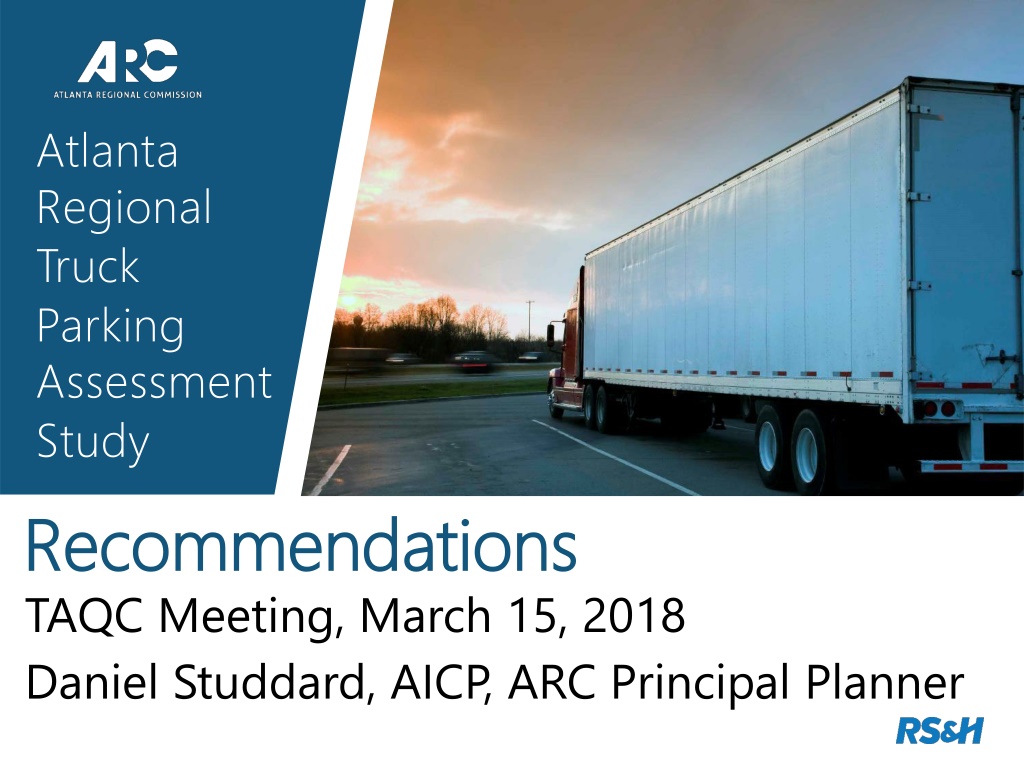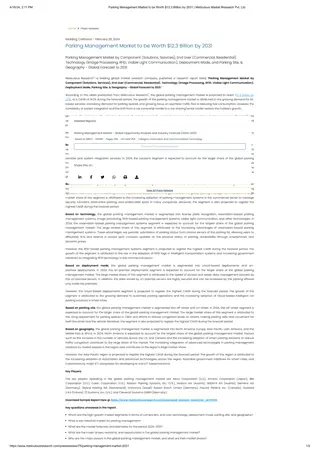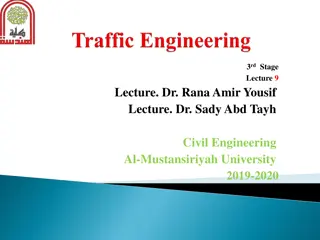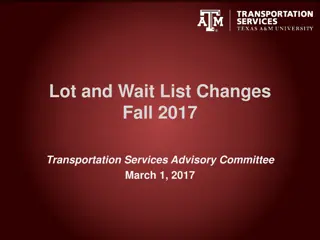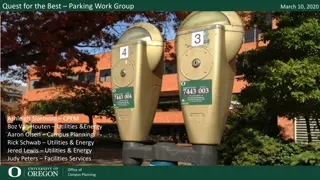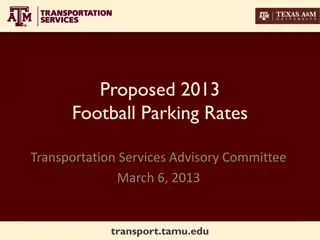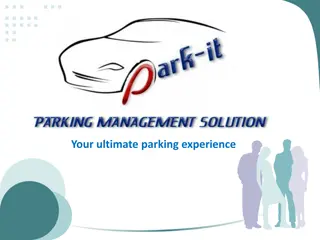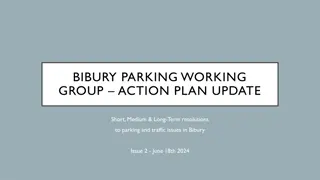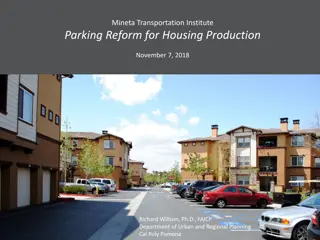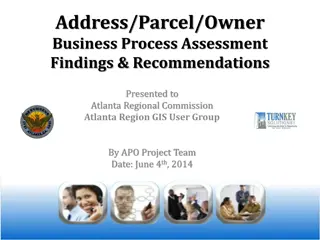Atlanta Regional Truck Parking Assessment Study Recommendations
The Atlanta Regional Truck Parking Assessment Study Recommendations were presented at a TAQC meeting in March 2018. The study highlighted critical issues in the trucking industry such as Electronic Logging Devices (ELDs) and Hours of Service (HOS) requirements. It also analyzed private truck parking spaces by county and surveyed truck drivers on their experiences finding parking in the Atlanta region. Draft strategies were proposed to address the shortage of truck parking, including adding/expanding supply, developing policies, fostering partnerships, improving information sharing, and incorporating future technology use.
Download Presentation

Please find below an Image/Link to download the presentation.
The content on the website is provided AS IS for your information and personal use only. It may not be sold, licensed, or shared on other websites without obtaining consent from the author. Download presentation by click this link. If you encounter any issues during the download, it is possible that the publisher has removed the file from their server.
E N D
Presentation Transcript
Atlanta Regional Truck Parking Assessment Study Recommendations Recommendations TAQC Meeting, March 15, 2018 Daniel Studdard, AICP, ARC Principal Planner Atlanta Truck Parking Assessment Study March 15, 2018
Regulatory Perfect Storm Regulatory Perfect Storm Electronic Logging Devices (ELDs) Dec. 2017 Hours of Service (HOS) Requirements Atlanta Truck Parking Assessment Study March 15, 2018 2
ATRI Critical Issues in the Trucking Industry 2017 ATRI Critical Issues in the Trucking Industry 2017 2) ELD Mandate 3) Hours of Service Requirements 4)Truck Parking Atlanta Truck Parking Assessment Study March 15, 2018 3
Private Spaces by County County Fulton Bartow Butts Carroll Haralson Jackson Morgan Coweta DeKalb Clayton Barrow Henry Walton Douglas Hall Forsyth Total Spaces 698 575 450 360 332 309 259 165 114 105 85 40 25 20 19 5 3,561 Atlanta Truck Parking Assessment Study March 15, 2018 4
Truck Driver Survey Results Truck Driver Survey Results 277 Responses How long does it usually take you to find truck parking in the Atlanta region? Length of time Less than 15 minutes 15 30 minutes 30 minutes 1 hour More than 1 hour Response 1.3% 6.5% 41.3% 51.0% Atlanta Truck Parking Assessment Study March 15, 2018 5
Draft Strategies Draft Strategies Report and Executive Summary available at: www.atlantaregional.org/truckparking 1. Add / Expand Truck ParkingSupply 2. Develop Truck Parking Policies 3. Develop Truck Parking Partnerships 4. Improve Sharing of Truck Parking Information 5. Monitor/Incorporate Future Use of Technology Atlanta Truck Parking Assessment Study March 15, 2018 6
Strategy 1: Add/Expand Supply Strategy 1: Add/Expand Supply 1.1 - Comprehensive Transportation Plans (CTPs) Authorized truck parking Unauthorized truck parking locations 1.2 - Freight Cluster Plans Inventory authorized & unauthorized parking Identify potential solutions 1.3 - Local Government / CID Solutions New truck stops Expand existing truck stops Shippers / receiver agreements Existing / closed rest areas Vacant industrial spaces / brownfield sites Park-and-ride lots (PM only) Shopping centers Atlanta Truck Parking Assessment Study March 15, 2018 7
Add / Expand Supply Example: Pilot Parking Program Example: Pilot Parking Program Drivers Requirements: Wear safety vests at all times Carry a flashlight at night Follow safety rules De-couple tractor from trailer May not move tractor Preferential treatment for no-idle cabs Atlanta Truck Parking Assessment Study March 15, 2018 8
Strategy 2: Policy Development Strategy 2: Policy Development 2.1 Share Warehouse/Distribution Costs/Benefits Require/incentivize shippers and receivers to provide parking Promote new truck parking Industrial areas / freight clusters CIDs 2.2 Review Development of Regional Impact (DRI) Requirements Truck stops Warehouse / distribution centers Atlanta Truck Parking Assessment Study March 15, 2018 9
Strategy 2: Policy Development Strategy 2: Policy Development 2.3 Promote Local Government Actions Review zoning codes Address any truck parking deficits, as needed 2.4 Develop Zoning Template Language Restrictions, permitted uses, design/aesthetic controls Examples: Buffers, plantings, lighting, electrification systems, and/or security 2.5 Incentivize Off-Peak Freight Operations Allow truck drivers to get closer to shippers / receivers Reduce miles driven and air emissions Atlanta Truck Parking Assessment Study March 15, 2018 10
Strategy 3: Partnerships Strategy 3: Partnerships 3.1 Provide ongoing updates to the Freight Advisory Task Force (FATF) 3.2 Provide truck parking information and resources to stakeholders and planning partners 3.3 Attend relevant meetings and participate in speaking opportunities 3.4 Participate in FHWA National Coalition on Truck Parking / FHWA coordination 3.5 Continue to discuss truck parking policy priorities, initiatives, and projects Atlanta Truck Parking Assessment Study March 15, 2018 11
FHWA National Coalition on FHWA National Coalition on Truck Parking Truck Parking June 2017 Activity Report Four (4) Working Groups to Assess: Parking Capacity Technology and Data Funding, Finance and Regulations State, Regional and Local Government Coordination Atlanta Truck Parking Assessment Study March 15, 2018 12
Strategy 4: Information Sharing Strategy 4: Information Sharing 4.1 Serve as regional clearinghouse for truck parking information 4.2 Monitor opportunities to implement real-time truck parking availability systems or implement other technology solutions Strategy 5: Monitor / Strategy 5: Monitor / Incorporate Future Technology Incorporate Future Technology 5.1 Dock Management Technology 5.2 Connected and Autonomous Vehicles 5.3 Internet of Things (IoT)/Physical Internet Atlanta Truck Parking Assessment Study March 15, 2018 13
Atlanta Regional Truck Parking Assessment Study Questions? Questions? Daniel Studdard, AICP, ARC Principal Planner dstuddard@atlantaregional.org Atlanta Truck Parking Assessment Study March 15, 2018
